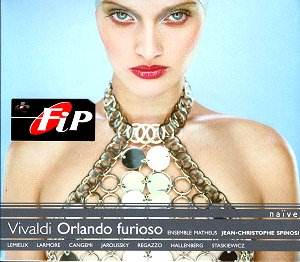This recording of Vivaldi’s
opera Orlando furioso is
the most recent operatic release in
the continuing Opus 111/Naïve Vivaldi
series. The series is taken from the
undisputed treasure trove that is the
collection of four hundred and fifty
Vivaldi manuscripts housed in the National
University Library at Turin in Italy.
The enterprising Opus 111/Naïve
enable the listener to explore the extensive
variety of Vivaldi’s output by using
the most eminent late-baroque vocal
specialists and finest possible period
instrumental and vocal ensembles in
the field of historically informed performance.
The success of this
Vivaldi series has been acknowledge
widely across the music industry to
considerable critical acclaim and has
now reached sixteen recordings. Notably
the performance of Vivaldi’s Vespri
Solenni per Assunzione di Maria Vergine
under the direction of Rinaldo Alessandrini
on OP30383 has won several highly prestigious
awards. There are a projected fifty
more recordings to be issued over the
next ten years with at least one operatic
work planned for release each season.
The copious booklet
notes are interesting and highly informative
and need to be owing to the usual convoluted
nature of the libretto by Grazio Braccioli
and the tangled chronicle leading up
to this recording. We are told that
in this adaptation of the most famous
episode from Ariosto's epic poem the
first performance was given at the Teatro
San Angelo, Venice, Italy in the autumn
of 1727. Under the direction of Jean-Christophe
Spinosi this is the first recording
of the meticulous reconstruction of
Vivaldi's original score.
In Orlando furioso,
Vivaldi depicts a set of astonishingly
lively and individualised characters
in an outrageous plot that moves at
a breathless pace. This gallery of remarkable
characters features Orlando, here no
longer as a baritone, but as a female
contralto who is given a series of astounding
virtuoso arias. Also present is the
tragic figure of the sorceress Alcina,
a voluptuous Angelica, the valiant Ruggiero
and the proud female warrior Bradamante.
To do full justice to this meticulously
assembled cast of vocal types, it was
necessary to find seven outstanding
singers possessing not only considerable
technical and expressive capacities,
but also subtle differences in timbre
and colour.
The talented and exciting
cast assembled here is certainly up
to the considerable challenges of the
demanding score. In the title role the
acclaimed young Canadian alto Marie-Nicole
Lemieux is in sumptuous voice with a
sense of real dramatic commitment. The
celebrated mezzo Jennifer Larmore does
not disappoint and gives a thrilling
and striking performance in her role
as Alcina. As Ruggiero the contro-tenor
Philippe Jaroussky, winner of the 2004
Victoires de la Musique in the 'Vocal
Discovery' category is dramatic and
eloquent with an appealing timbre to
his voice. I particularly enjoyed hearing
Argentine-born soprano Veronica Cangemi,
who as Angelica gives a most appealing
performance with expert and admirable
execution.
This may prove to be
the golden age for period informed performances
of Vivaldi scores on record. There are
several outstanding specialist period
instrument ensembles that have come
to prominence on the late-baroque scene
in the last ten or so years and have
successfully ratcheted-up the level
of technical proficiency and interpretation
by several notches. Undoubtedly the
earlier pioneering interpretations of
Vivaldi and baroque music in general
using period-instruments were dictated
primarily by the severe limitations
of their instruments. Consequently performance
style often came across as technically
mechanical, rather lacklustre, frequently
insipid and even sterile. These contemporary
specialist performers explore and exploit
the strength of their period instruments
rather than being restricted by the
weaknesses. The most acclaimed specialist
ensembles include most notably: the
Concerto Italiano under Rinaldo Alessandrini;
the Venice Baroque Orchestra under Andrea
Marcon; Europa Galante under Fabio Biondi;
The English Concert now under the direction
of Andrew Manze; the Ensemble Explorations
under Roel Dieltiens; the Freiburger
Barockorchester under Gottfried von
der Goltz and the Polish based Arte
Dei Suonatori under Rachel Podger.
On this evidence the
French forces of the Choeur Les Elements
and the period instrument Ensemble Matheus
under the expert direction of founder
member Jean-Christophe Spinosi also
prove themselves to be at the forefront
of historically informed late-baroque
interpretations. I just love their unbridled
enthusiasm for the score with a performance
highly infused with immediacy and vitality
without ever losing that element of
stylishness.
The sound quality is
most pleasing and the annotation is
of an exceptionally high standard. This
Vivaldi series continues to go from
strength to strength.
Michael Cookson












